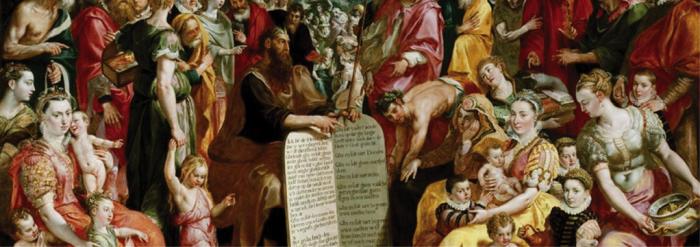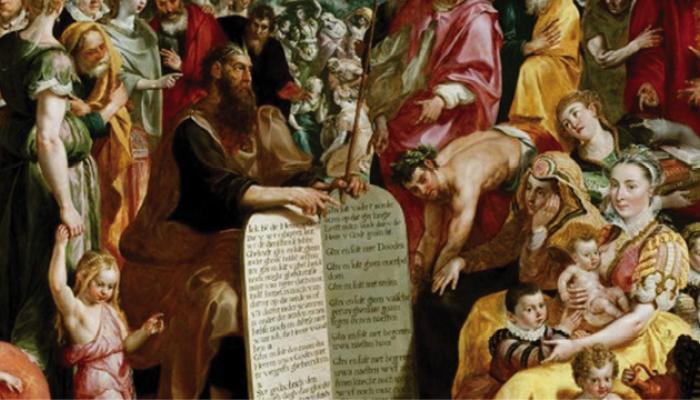
4.9 A janë ende të rëndësishme Dhjetë Urdhërimet?
Dhjetë Urdhërimet përmbajnë rregulla shumë të përgjithshme të sjelljes, të cilat shumica e njerëzve i pranojnë, veçanërisht shtatë urdhërimet e fundit. Tri urdhërimet e para kanë të bëjnë me marrëdhënien tuaj me Zotin. Urdhërimet nga i katërti deri në të dhjetin lidhen me marrëdhënien tuaj me njerëzit e tjerë
Dhjetë Urdhërimet kanë për qëllim t'ju ndihmojnë të jetoni në një mënyrë vërtet njerëzore, në mënyrë që ju të mos harroni se kush jeni në të vërtetë. Në këtë mënyrë ju gjithashtu qëndroni pranë Zotit, i cili ju krijoi. Në aplikacionin #TwGOD, do të gjeni Dhjetë Urdhërimet në seksionin që përmban formulime standarde të fesë katolike (lutjet katolike).
What are the Ten Commandments?
- I am the Lord your God: you shall not have strange Gods before me.
- You shall not take the name of the Lord your God in vain.
- You shall keep holy the Lord’s day.
- Honor your father and your mother.
- You shall not kill.
- You shall not commit adultery.
- You shall not steal.
- You shall not bear false witness against your neighbor.
- You shall not covet your neighbor’s wife.
- You shall not covet your neighbor’s goods.
[Youcat 349]
“Mësues, çfarë të mirë më duhet të bëj për të fituar jetën e pasosur?” (Mt 19,16).
Djaloshit që i drejton këtë pyetje Jezusi i përgjigjet: “Nëse dëshiron të hysh në jetë, zbatoji urdhërimet” dhe pastaj shton: “Eja e më ndiq mua” (Mt 19, 16.21). Ndjekja e Jezusit kërkon zbatimin e Urdhërimeve. Ligji nuk është shfuqizuar, por njeriu është thirrur që ta gjejë atë në personin e Mësuesit hyjnor, që e realizon atë në mënyrë të përsosur në vetvete, zbulon kuptimin e plotë të tij dhe vërteton përjetësinë e tij. [KKKP 434]
Urdhri i Hyjit: “Mos bëj kurrfarë përfytyrimi të gjërave...” (Dal 20, 4) a e ndalon kultin e ikonave?
Një urdhërim i tillë, në Besëlidhjen e Vjetër, ndalonte paraqitjen e Hyjit, absolutisht transhendent. Duke u nisur nga Mishërimi i Birit të Hyjit, kulti i krishterë i ikonave të shenjta është i lejuar (sikurse pohon Koncili i Dytë i Nikesë në vitin 787), meqenëse bazohet në misterin e Birit të Hyjit të bërë njeri, në të cilin Hyji transhendent bëhet i dukshëm. Nuk bëhet fjalë për adhurimin e një ikone, por për një nderim të atij/ asaj që paraqitet në ikona: Krishti, Virgjëra Mari, Engjëjt dhe Shenjtërit. [KKKP 446]
Çfarë ndalon Urdhërimi i pestë?
Urdhërimi i pestë ndalon, si në kundërshtim të rëndë me ligjin moral:
- vrasjen direkte dhe të vullnetshme, si edhe bashkëpunimin në të;
- abortin direkt, të dashur si qëllim ose si mjet, si dhe bashkëpunimin në të, me dënim shkishërimin, sepse qenia njerëzore qysh prej ngjizjes së saj, duhet të respektohet dhe të mbrohet në mënyrë absolute në tërësinë e vet;
- eutanazinë direkte, që konsiston në të dhënit fund, me një akt ose një lëshim të një veprimi të duhur, të jetës së personave me aftësi të kufizuara, të sëmurë ose në prag të vdekjes;
- vetëvrasjen dhe bashkëpunimin e vullnetshëm në të, që është një fyerje e rëndë ndaj dashurisë së drejtë për Hyjin, për vetveten e për të afërmin: përsa i përket përgjegjësisë, ajo mund të rëndohet për arsye të shkandullit ose të lehtësohet për shkak të çrregullimeve të veçanta psikike ose nga frika e madhe.
[KKKP 470]
Përse Urdhërimi i gjashtë, edhe pse thotë “mos thyej kurorën”, i ndalon të gjitha mëkatet kundër dëlirësisë?
Edhe pse në shkrimin biblik të Dhjetë Urdhërimeve lexohet “Mos bëj kurorëthyerje” (Dal 20, 14), Tradita e Kishës ndjek në përgjithësi mësimet morale të Besëlidhjes së Vjetër e të Re dhe e konsideron Urdhërimin e gjashtë si përfshirës të të gjitha mëkateve kundër dëlirësisë. [KKKP 493]
Are the Ten Commandments a random list?
No. The Ten Commandments form a unity. One commandment refers to another. You cannot arbitrarily toss out individual commandments. Someone who breaks one commandment is violating the whole Law.
What is remarkable about the Ten Commandments is that all of human life is included within them. Indeed, we men are related at the same time to God (Commandments 1–3) and to our fellow men (Commandments 4–10); we are religious and social beings. [Youcat 350]
Is atheism always a sin against the First Commandment?
If someone intentionally and explicitly denies God, he sins against the first commandment. However, his responsibility may be seriously impaired, as when, for example, he has learned nothing about God or has examined the question about God’s existence conscientiously and cannot believe.
The line between being unable to believe and being unwilling to believe is not clear. The attitude that simply dismisses faith as unimportant, without having examined it more closely, is often worse than wellconsidered atheism. [Youcat 357]
Why does the Old Testament forbid images of God, and why do we Christians no longer keep that commandment?
In order to protect the mystery of God and to set the people of Israel apart from the idolatrous practices of the pagans, the First Commandment said, “You shall not make for yourself a graven image” (Ex 20:4).
However, since God himself acquired a human face in Jesus Christ, the prohibition against images was repealed in Christianity; in the Eastern Church, icons are even regarded as sacred. The knowledge of the patriarchs of Israel that God surpasses everything (transcendence) and is much greater than anything in the world lives on today in Judaism as in Islam, where no image of God is or ever was allowed. In Christianity, in light of Christ’s life on earth, the prohibition against images was mitigated from the fourth century on and was abolished at the Second Council of Nicaea (787). By his Incarnation, God is no longer absolutely unimaginable; after Jesus we can picture what he is like: “He who has seen me has seen the Father” (Jn 14:9). [Youcat 358]
Why do Christians replace the Sabbath with Sunday?
Christians replaced the celebration of the Sabbath with the celebration of Sunday because Jesus Christ rose from the dead on a Sunday. The “Lord’s Day”, however, does include elements of the Sabbath.
The Christian Sunday has three essential elements: (1) It recalls the creation of the world and communicates the festive splendor of God’s goodness to the passage of time. (2) It recalls the “eighth day of creation”, when the world was made new in Christ (thus a prayer from the Easter Vigil says: “You have wonderfully created man and even more wonderfully restored him.”). (3) It includes the theme of rest, not just to sanctify the interruption of work, but to point even now toward man’s eternal rest in God. [Youcat 364]
How do Christians make Sunday “the Lord’s day”?
A Catholic Christian attends Holy Mass on Sunday or on the vigil of Sunday. On that day he refrains from all work that would prevent him from worshipping God or disturb the festive, joyful, restful, and restorative character of the day.
Since Sunday is an Easter celebration that occurs each week, Christians from the earliest times have gathered together on that day to celebrate and thank their Redeemer and to reunite themselves with him and with others who are redeemed. So it is a central duty of every conscientious Catholic Christian to “keep holy” Sunday and the other holy days of the Church. One is exempted from it only by urgent family duties and important responsibilities in society. Because participation in the Sunday Eucharist is fundamental for a Christian life, the Church explicitly declares that it is a serious sin to stay away from Sunday Mass without good reason. [Youcat 365]
Nuk është për t'u habitur ... që Besëlidhja e Hyjit me njerëzit e tij është aq e lidhur ngushtë me perspektivën e jetës, gjithashtu në dimensionin e saj trupor ... Ajo që është në lojë është ... bota e sotme dhe e së ardhmes dhe ekzistenca e mbarë njerëzimit. Në fakt, është krejt e pamundur që jeta të mbetet autentike dhe e plotë sapo të shkëputet nga e mira; dhe e mira, nga ana e saj, lidhet në thelb me urdhërimet e Zotit, domethënë me "ligjin e jetës" (Sir 17:11). [Papa Gjon Pali II, Evangelium Vitae, Nr. 48]





